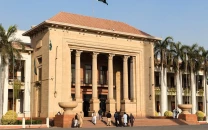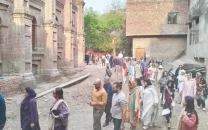Rocky road: ‘Revive live music to rejuvenate a threatened industry, say music researcher
Speakers seek alternatives to corporate sponsorship model for music in Pakistan.

The discussion focused on the decline of the music industry in Pakistan.
The talk was conducted by Jamal Rahman of Trew Brew Records and Abbas Jaffer, a music researcher from Harvard University.
The discussion focused on the decline of the music industry in Pakistan.
Speakers talked about new space created by private music channels in the previous decade. They said it had led to the birth of hundreds of local bands and created a culture of live concerts.
“It was during this time that Jal, Noori and Zeb and Haniya became household names,” they said.
Jaffer said General (retd) Pervez Musharraf’s era had seen a lot of music being produced in the country.
“At one point channels were getting so many requests from musicians that even with 24-hour streaming, they did not have time to accommodate the content,” he said.
He said Coke Studio had emerged during this period. He said initially, it had focused on distribution through television and radio.
“When they saw a lot of enthusiasm for this, they ramped up their social media content,” he said.
“The behind-the-scenes content came later because they saw their social media presence as an opportunity to reach to a larger audience,” he said.
He said the efficacy of this corporate-sponsorship model had declined.
“It has to be replaced now by alternative models,” he said.
He gave the example of an online series titled The Drawing Room Session which was initially to be aired on MTV-Pakistan.
“When the channel wrapped up in Pakistan, the content was put online,” he said.
He said most music channels in Pakistan had now shifted from airing local music to showcasing Indian songs.
Rahman said music industry was declining because space for live music and concerts had diminished.
“Music is essentially a performance art where interaction between the audience and the artist is important,” he said.
“In the mid-2000s, the corporate sector stepped in and started handing free passes to the audience. They spoiled the concert-going community and now everyone expects concerts to be free,” he said, pointing to people who did not want to pay for entertainment, especially music.
He said music scene in Pakistan could not be fairly be described as an “industry” because there was no commerce of any sort.
He said that it was important to make music “cool”.
“Music needs to be discussed. Bloggers should write about it, there should be TV shows on new music,” he said.
He said a few years ago, there was no fashion industry but a few individuals had gotten together and generated interest in it.
“Similarly interest can be revived in music by having live performances,” he said.
Jaffar said his research showed that lower-income groups were willing to pay for entertainment, be it a Bollywood movie or an Anwar Maqsood play.
Rahman said that the one good thing that had come out of the recent developments was that the musicians in Pakistan were not conscious of consumers. He said this had given them the opportunity to experiment with different genres.
Published in The Express Tribune, May 16th, 2015.



















COMMENTS
Comments are moderated and generally will be posted if they are on-topic and not abusive.
For more information, please see our Comments FAQ